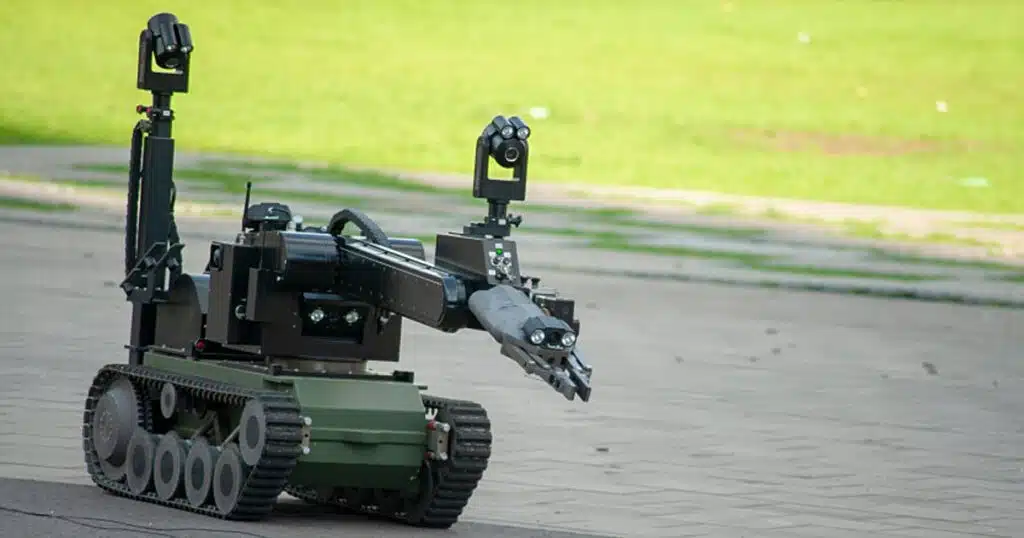
Progressive San Francisco Supervisors Vote IN FAVOR of Lethal Police Robots
In a city that’s put in place some of the strictest gun laws in the nation and its mayor was one of the first politicians to call for defunding the police after the death of George Floyd in 2020, the board of supervisors in San Francisco has just voted to allow police to use remote-controlled — and potentially lethal — robots in emergency situations. Really.
The 11-member panel, Democrats all, supported the police robot program late Tuesday on an 8-3 ballot, after an impassioned debate that laid out deep divisions on the board over the role of law enforcement.
Civil liberties advocates and representatives from police oversight groups voiced emphatic objections to the option, with some opponents saying the robots would lead to further militarization of a police department long considered overly aggressive towards poor and minority communities.
Supervisor Connie Chan, who sat on the committee that sent the proposal to the full board, said she understood use of force concerns, yet, “according to state law, we are required to approve the use of these equipments [sic]. So here we are, and it’s definitely not a easy [sic] discussion.”
Supervisors amended the proposal to specify police officers may deploy the new robots only after using alternative force or de-escalation tactics — or after determining they would not be able to subdue a suspect through those alternative methods.
Only a limited number of high-ranking officers could order using robots as a response to deadly force.
In 2016, an explosives-armed robot was used for the first time in the U.S when Dallas police sent in an armed robot that killed a sniper who was holed-up after killing five officers in an ambush.
San Francisco police currently have a dozen functioning ground robots acquired between 2010 and 2017 and mainly used for tasks that include assessing explosive devices and helping police better “see” in low-visibility situations, the department explained, but none have ever been used to deliver lethal force..
Specific authorization for using robots is required by a new state law that mandates police and sheriff departments to inventory their military-grade equipment and ask approval to use them.
San Francisco police confirmed earlier this week that none of the department’s robots were obtained from military surplus, but some were purchased with federal grant money.
Debate over the robotics initiative ran more than two hours Tuesday with members on both sides of the issue accusing their opponents of recklessly promoting fear among city residents.
Prior to the meeting, the San Francisco Public Defender’s office sent a letter to the board that stated granting police “the ability to kill community members remotely” runs counter to the city’s progressive values. As such, the office wanted the board to support language barring police from using robots against any person in an act of force.
Voting in favor of the policy authorization, Supervisor Rafael Mandelman said he was troubled by rhetoric painting the police as untrustworthy and dangerous.
“I think there’s larger questions raised when progressives and progressive policies start looking to the public like they are anti-police,” he said. “I think that is bad for progressives. I think it’s bad for this Board of Supervisors. I think it’s bad for Democrats nationally.”
Board President Shamann Walton, who voted against the robots, noted his lack of support didn’t make him anti-police, but “pro people of color.”
San Francisco’s leaders “continuously are being asked to do things in the name of increasing weaponry and opportunities for negative interaction between the police department and people of color,” he said. “This is just one of those things.”
Supervisor Aaron Peskin acknowledged why the robot idea is so controversial, as it speaks “to fears about a dystopian robot killing future…I understand the concern and fear that that can evoke in our society,” Peskin.
Supervisors Dean Preston and Hillary Ronen announced their opposition to the authorization.
“San Francisco is not a war zone and these kinds of devices are not needed to protect this city,” Preston said.
The San Francisco Police Department said it does not now have pre-armed robots, nor is it planning to arm robots with guns. Instead, the agency could deploy robots equipped with explosive charges “to contact, incapacitate, or disorient violent, armed, or dangerous suspect” when lives are at stake, SFPD spokesperson Allison Maxie said in a statement.
“Robots equipped in this manner would only be used in extreme circumstances to save or prevent further loss of innocent lives,” she said.
Across San Francisco Bay, the Oakland Police Department has decided to shelve a similar proposal after strong public resistance to the plan.



